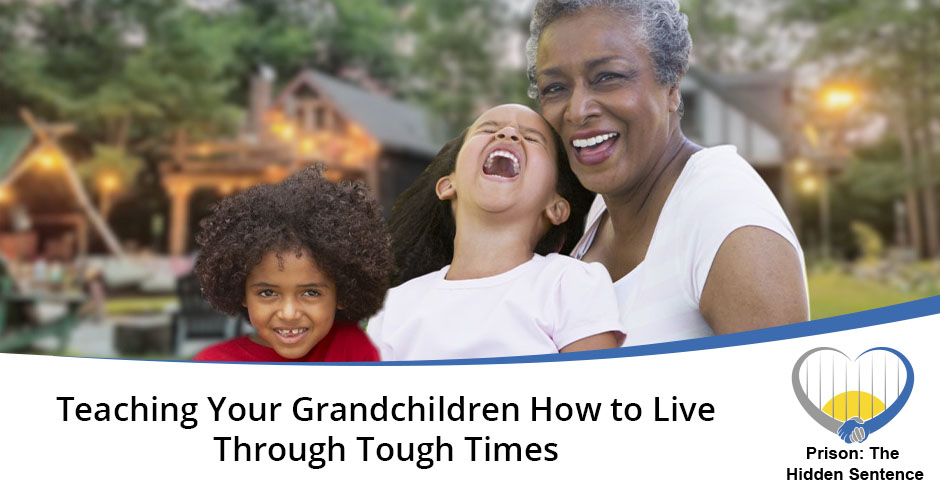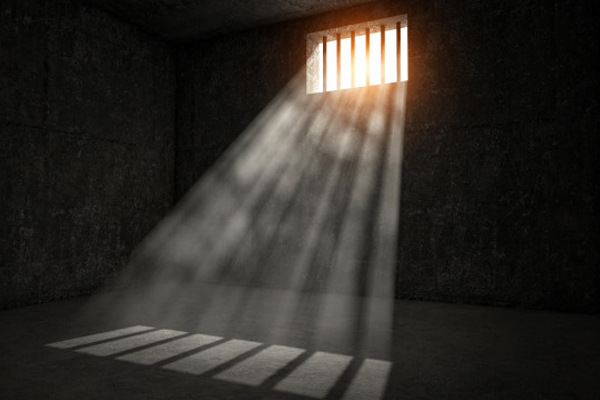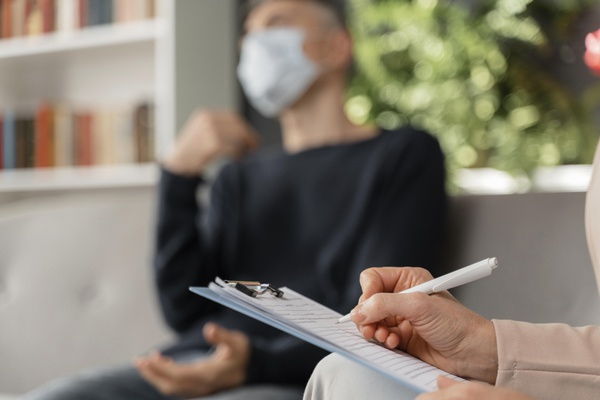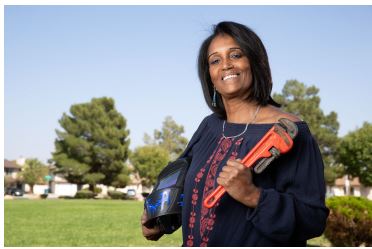
Evelyn’s job is to take care of her granddaughters and help them live a life different from her daughter’s. Julia Lazareck brings Evelyn Pacheco to the show to talk about her situation and how she’s solving it with Nevada Women in Trades. Evelyn is the founder of this organization that helps women who just got out of jail find a job. She helps them change their lives so that they can support those that they love.
—
Listen to the podcast here:
Teaching Your Grandchildren How to Live Through Tough Times
I’m here with Evelyn Pacheco who is the first black woman in Nevada to receive a plumber’s license and Commander of the American Legion Post 51. She’s an Army veteran, a mother, a grandmother and Founder of Nevada Women In Trades. Evelyn, you had a lot of accomplishments in your life and you’re helping so many people in addition to caring for your beautiful granddaughter. Let’s start with your daughter’s incarceration. When your daughter was incarcerated, how did you feel?
When it first happened, I felt by myself. I felt alone and no one understood. I felt the system is a revolving door and I found that out.
Don't judge people for their mistakes. It's not who they are. It's what they did. Share on XIt’s tough. Your daughter’s been in and out and she has a daughter that you’re caring for. How is she doing?
She’s handling it okay but there’s going to be things, emotional stress. PTSD is the terminology everyone’s using now for everything and she’s going to have some of that, a feeling that, “You’re leaving me. You’re not coming back.” That’s not good for a child that’s under five years old to feel that. That’s a lot of stress right there and that’s not healthy. No term is that healthy for any child that’s going through that for that matter. It’s not healthy for these children. It’s just my opinion. It’s not healthy to be seeing a lot of this.
She’s lucky she has you. What are some things you’re doing with her? Maybe some examples that might help other people.
We went to Springs Preserve. Anyone who hasn’t been there, you need to go.
Here in Las Vegas, it’s not just casinos.
We went there and we did the train. You go on a train and around this trail. It talks about Nevada, how it started, what was going on, the wetlands that were here and then you go to the museum. It talks about the mammoths they found here and all the historical things about Nevada. It’s just wow. I go in there. They talk about all the animals that are here and all the mining that was done. It’s cool to give the girls that history. I love history. Everyone should know their history and where they came from. It helps you to where you’re going. It’s cool.
They go to Wet‘n’Wild. They’ll be opening up and it’s where they go swimming. They do that. I take them with me when I do my panels like here on Zoom right now. I have them here listening, which they listen anyways. I took them up to the legislation twice. When I go to speaking before the pandemic, I would take them when I go speak. It’s important that they learn everything that they’re all, well–rounded at that and have that sense of empowerment that I can talk to you regardless of my past and what happened back there and my family. You can be successful. You really can.
You’re helping them by taking them to different places, exposing them to things so that they see that there is life out there, how things are working in the outside world and exposing them to a lot of things so that they’re not just worried about having a family member that’s incarcerated. They’re seeing that there’s a whole world out there and you’re exposing them to different things. Those are good things that people can do if they have children is to take them to local activities, local museums, local parks and do, for lack of a better word, normal things.
Have they been to the prison to see them?
Yeah and then I stopped but that’s my own personal thing. Everyone has their own decisions. I don’t knock anybody that’s bringing their kids or grandkids to go see their family or friends. I don’t but I just couldn’t do it after a certain age with her. I didn’t want that. I didn’t want her to see that. I don’t know. She talked on the phone with her when she called and maybe I’m wrong for doing that but that’s my own personal thing.
Have you had that conversation with her?
Yes. She knows. She gets it. She remembers because we go by the building. She goes, “I’ve been in there.” Yeah, you did. I didn’t really tell her why she went in there but I’m like, “Yeah, we’ve been in there.” It’s not just their mother. There are others that we went there and visited too but I think you need to have something on the outside if you can that writes you letters, that may give you a package, that may receive your phone call sometimes and let you know that you are loved out here. Get through it and then get back out. Let’s try to do the right thing this time. If you don’t, that’s your choice.
Support is important especially because most of the people that are incarcerated are going to come home someday and when they have that support and know that there are people on the outside that love them, that will help their re-entry, along with other programs and other things that are out there. I wanted to touch on something you said in the very beginning about how you felt when your daughter was incarcerated. That you felt alone and didn’t have anybody to talk to. Have you found any support? I know that there’s a local support group, the FFIP group that you’ve attended.

That’s the only group that I attended. It’s hard for this right here because I get guarded. On the trust level, it has changed because it’s hard to go in there and tell this person, “Hang in there.” You’re not in there doing time. You’re out here still waking up. Nobody’s telling you what to do and when to do it. It’s their choice too, the decisions they made and all that. I get that but it’s still family and you still love them. You’ve got to do what you’ve got to do.
It’s not who they are. It’s what they did. They’re still a person and it’s important for us to humanize them. However, when somebody is incarcerated on the inside, there is a hidden sentence on the outside for the family because you don’t have anybody to talk to a lot of times. Finding a group is important and I’m glad that you’ve attended those meetings and you’ve added a lot of information and help people. When you come to the meetings, it not only helps you but it’s also helping other people because then nobody feels alone.
It’s hard to talk about it because you think you’re going to get shamed. What’d you do? Shame me then but when it happens to them then they want to come over and talk to you like, “Yeah.” A few years ago, you’re shaming me. Now, you’re over here talking about, “I remembered.”
It could happen to anybody.
That’s how laws have changed, which is interesting. Laws could change when something happens to somebody that’s important out here and that’s sad that all of a sudden, “Maybe we don’t want to have that harsh drug charge no more because so-and-so did this. Maybe we don’t want to do this because this is happening.” It’s interesting how that works out.
You started Nevada Women In Trades because you wanted to help these women that were coming out of prison. Could you give us a little background on how you started it and why?
There are two main reasons. I started it because of the grandbabies. I wanted to show them this is what you do. This is how you support the community. These are the things you’ve got to do to support the community. This is the outreach that needs support in the community. The other was being told that I couldn’t do it. I shouldn’t do it. Getting hung up on my face and getting told that I’d never get this off the ground. All that stuff you get told. We go through that as women. Being told what we can’t, shouldn’t, don’t, stop and quit.
I talked to Dumas Martin who has The Idea Club and he was like, “This is going to work.” He said, “You are going to change a lot of women’s lives.” I’m like, “I’m doing this because I want to help.” He’s like, “You’re going to change lives, not just help.” My outreach is re-entry, women coming out of prison, veteran women like myself, women coming out of domestic, women coming out of human trafficking and women coming out of fostering.
Those are all situations where there’s a lot of area of needing support to get you to be able to take care of yourself and be financially stable. We do that. We help them get into the trades. We help them with their resume. We help them with their OSHA, CPR, and Forklift Awareness. We help them with interviewing skills. We even bring them to different trade facilities. We have speakers come on as yourself. You have been a speaker and I’m hoping you’re going to do it again because we got another class coming up.
When you were talking about trades and I’m not sure if everybody knows what that means. Can you explain what trades are?
Kids are here to be taught. The adults are the teachers that will lead them to the next generation. Share on XTrades, different contractors, construction, unions like laborers, operators, roofers, plumbers, pipefitters, HVAC, iron workers, sheet metal and carpenters. There are sixteen of them and you can go on. It’s everything. You can go on SNBTU.Org and check out trades that are on there. You can call the apprenticeship programs and talk to them.
I wanted to say this is amazing. You’re taking women and training them to be in these trades where they can make a good living and support themselves.
Correct. I made $100,000 when I was working before I retired.
That’s wonderful because when people come out of prison, a lot of times they’ll work at a convenience store or someplace. Here they can get training to have a trade that will support them for the rest of their lives and to support their families. I think that’s such a wonderful thing that you’re doing and helping so many women.
I did have an opportunity to speak at one of your classes and attend one of your graduation ceremonies for them. How wonderful is that? Not only do they get the training but they get graduation, a certificate and these accolades. They feel so empowered and proud and able to do things. It’s such a wonderful thing that you’re doing and also what you’re doing is showing your grandbabies what they can do. You are exposing them. You bring them to meetings, you show them exactly what you’re doing and what they can do.
I was told that kids are here for us to teach them, not here for us not to. We are the leaders when we become adults and we are to do as such and to make sure that we bring the next generation into where they need to be. It’s our responsibility in other words. That’s what I feel.
It seems like the girls are doing really well. I’ve met them and they’re precious. Girls are girls and kids are kids. They have their days but all in all, I think that they’re doing well and I think it’s due to you exposing them to so much. Anybody that is a caretaker, it’s really important to listen to some of the things that Evelyn’s done with her grandbabies because they’re thriving because they’re getting exposed to all this and getting to see different things and living life. Have they had any circumstances or situations where it’s come up that their mom was incarcerated, a family member was incarcerated in school or anywhere they had to deal with? Did you ever have those conversations with them in school or anywhere?
When you’re a guardian, you’ve got to bring paperwork to them and do all of that because nowadays you have to have a guardian. Otherwise, you can’t do anything.
It’s really how they handle it and I think the kids‘ groups are really good that they can talk to other kids, relate and have a facilitator talk about that stuff like bullying or anything that comes up. There are other places where the kids can get guidance and learn how to handle some of that. I think it’s good that they’re doing that too.
It’s a good idea to bring them to therapy too and everything. That’s important. I think everybody should go to therapy early on.
Everybody has something, not just incarceration. Everybody has something going on.
I think everybody needs to sit on the couch once in a while to get it out so they can feel better. It’s a good idea to do. Therapy is very important. To have somebody else to talk to that has no ties to something that wants to help you out and be a support for you.
Finding a good therapist, a good support group or friends that you can talk to, a lot of people go into a hole. They hide. They don’t want to talk to anybody and it’s not good to hold it in. It’s got to come out sometimes somewhere so talking to people and finding the right people to talk to is important.
I talked about that with the ladies about you have to learn to come out of it. You do. You have to come out of that. I’m not saying you can’t be in it when you’re going through it. I’m not saying that but what I’m saying is don’t stay in it. Give yourself timetables. I’m only going to sit here and dwell on this situation for a certain amount of time, days or whatever. I’m not going to sit in this bid by myself. Don’t talk to nobody. Don’t answer the phone for a week. It was interesting because one of the ladies that was with me when I first started Nevada Women In Trade told me, she goes, “You’re always going to go through some stuff. You’re always going to go through some problems.”

You’re always going to have something going on because life is not like that. Life doesn’t do this right here. Life goes up, down, up, down. Sometimes the peaks are higher than some of the others. You have to go through it but you still have a business to run. You still have a family to do it. You have to come out of it. You have to snap out of it and that made sense when she was saying that. Maybe that’s not healthy either but I do sit in it for a little bit so I can recognize whatever it is and deal with it. I don’t stay in it. I might talk about it here and there too but talking about it, sitting in a room and not answering the phone are two different things.
I hear you. I was going to ask you. Usually, at the end, I ask people if they have any good advice to help people. I think you just covered a lot of things and I don’t know if there’s anything else you want to add as a caregiver. Any advice to people that might be new caregivers?
Not everyone can go get the grandkids. Not everyone can handle that. Not everyone has the capabilities. Not everybody has the income. Most states give the grandparents a little bit of income. It’s not a lot but they do give them a little bit of income to help with the grandkids. It’s a different thing. Taking care of the grandkids versus the mother taking care of the grandkids. There are groups. I’m a part of another group. She does a lot. On Thanksgiving and Christmas, she’ll call me. Do you need a basket? Are you good? Sometimes you’ll have a thing where she’s doing toys for the kids or maybe got some sheets, extra clothes, food and she’ll call me up. Do you need anything? Kinship was another support for me, too.
“There are some resources out there for us.” If you feel that you can’t take your grandkids, don’t feel bad about it. It’s life. We all have the things that we can and can’t do. As long as you still support some later on down the road and make sure they know who you are, you’re good.
You do what you can and you’ve got to feel good about it. You can’t do everything. I thank you for your time and for sharing. I appreciate you so much.
—
I just want to take a minute to tell you about Prison: The Hidden Sentence book. There are so many things that you need to know when a loved one is taken into the prison system that nobody tells you. This book will provide valuable information to help you as you go through the stages of the prison system with your loved one. I also share stories so you know that you’re not going through this alone. Prison: The Hidden Sentence book can be purchased on Amazon.
For anybody that hasn’t visited a jail or prison, you either need to make an appointment or fill out some paperwork. You need to get approved to go so you can’t show up and say, “I want to see my loved one.” You’ve got to be beforehand and sometimes make an appointment. That’s good information to share. We have a lot of information but you’re just giving and helping. I think it’s a wonderful role model for the girls. That’s what you’re doing. You’re showing them an action. You’re doing it. You’re not just telling them about it. You’re doing it and they’re seeing you do it. They’re helping you do it. I think that’s wonderful.

Thank you.
Important Links:
- American Legion Post 51 – Facebook
- Prison: The Hidden Sentence
- https://NevadaWIT.org
- https://SNBTU.org
- https://www.FosterKinship.org
- https://TheFFIP.org/calendar
About Evelyn Pacheco
 While working at a Las Vegas Casino in the Engineering Department a co-worker told Evelyn about a Union Apprenticeship Training Program with the Plumbers, Pipefitters & HVAC UA Local Union 525. She applied, and after five years of working as an Apprentice while taking care of her family, she finally made history as Nevada’s first licensed Black female plumber.
While working at a Las Vegas Casino in the Engineering Department a co-worker told Evelyn about a Union Apprenticeship Training Program with the Plumbers, Pipefitters & HVAC UA Local Union 525. She applied, and after five years of working as an Apprentice while taking care of her family, she finally made history as Nevada’s first licensed Black female plumber.
Evelyn is letting women know that it doesn’t matter how hard your life is or was, you can still make something of your life. She has leveraged her experience to help all Women through the “Nevada Women In Trades” (NVWIT) organization, a nonprofit organization she formed to increase the number of women in trades. It is a signature program called “Pipeline” that is a 190-hour pre-apprenticeship training delivered in small group classes over a six-week period.
NVWIT is increasing the number of Women in the Nevada workforce, specifically in highly skilled blue-collar (trade) occupations. For more information about Nevada Women in Trades, to apply, or refer Women for the next Pipeline Comprehensive Course (PCC), email info@nevadawit.org.

Leave a Reply